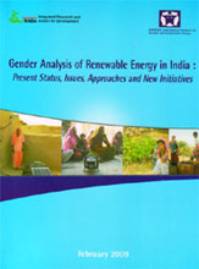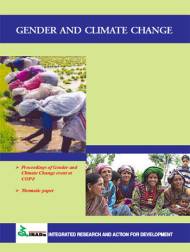Poverty Alleviation & Gender > Publications
The Energy, Poverty and Gender Nexus in Himachal Pradesh, India: The Impact of Clean Fuel Access Policy on Women’s Empowerment (2009)
A Gender and energy issues have remained on the periphery of development policy, and require greater political attention and backing. Given that women are particularly impacted upon by the continued use of traditional fuels, a specific commitment is necessary to provide them with cleaner fuel choices, as well as rural electrification options that can also provide better opportunities for income generation through agriculture and smallscale industries. Gender empowerment is clearly linked with access to modern fuels which can free women from time-consuming daily drudgery. Moreover, access to modern fuels can have an impact on the Millennium Development Goals in areas such as literacy, life expectancy and child mortality. IRADe suggested measures for policy adjustment in favour of more use of renewable at the national as well as state level and involving women by suggesting business models to promote village level entrepreneurships besides being beneficiary, women need to be involved in process of the decision making and implementation.
 Gender Analysis of Renewable Energy in India: Present Status, Issues, Approaches and New Initiatives (2009)
Gender Analysis of Renewable Energy in India: Present Status, Issues, Approaches and New Initiatives (2009)
A gender analysis exercise has been carried out to promote an approach that would lead to nationalenergy policies becoming more gender responsive in terms of content and process. A sound gender-responsive energy policy and, more importantly, its coordinated implementation are the keys to successful economic development. Unlike a gender audit of an organization, the gender analysis of the energy sector in India concentrates on the concerns over gender in the content of energy policy and strategies, and their impact on gender relations, in terms of addressing women’s practical and strategic needs within a framework of gender, energy and poverty linkages.
 Mainstreaming Gender in Energy Policy (2008)
Mainstreaming Gender in Energy Policy (2008)
Energy is a key factor in economic and social development. Worldwide, more than two billion people lack access to sustainable and modern energy services, using traditional solid fuels for cooking and heating. . Thus, greater attention to the needs and concerns of women in these areas could help governments promote overall development goals like poverty alleviation, employment, health, and education through improved energy policies.
Women in India should be more assertive regarding their fuel needs
A Jyoti Parikh: Home and hearth
Jyoti Parikh / New Delhi October 13, 2005
Article by Dr. Jyoti Parikh based on the study done by Integrated Research and Action for Development (IRADe) over Himachal Pradesh. This article is about the condition of women and their roles and responsibilities. It highlights the health problems faced by women due to the type of fuel available to them.
 Gender and Climate Change: Proceedings and Thematic Paper (COP8, 2002)
Gender and Climate Change: Proceedings and Thematic Paper (COP8, 2002)
This contains the details of the event at COP8 which was primarily related to Vulnerability, Adaptation, Mitigation and Financial Mechanisms Prepared by Integrated Research and Action for Development (IRADe) ENDA Tiers Monde. Dr. J Parikh gave her views on the significance of gender issues as a part of the climate change agenda.
